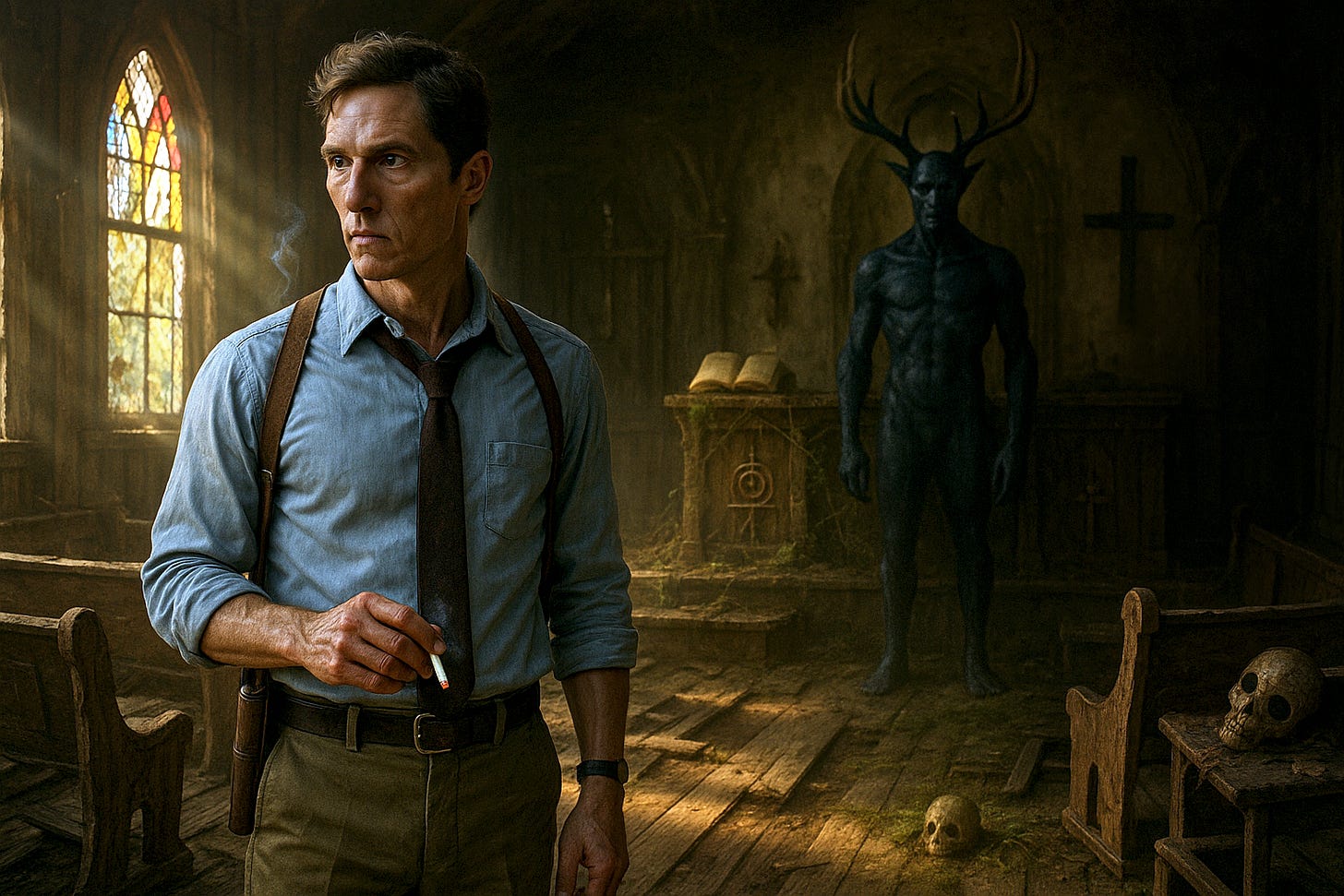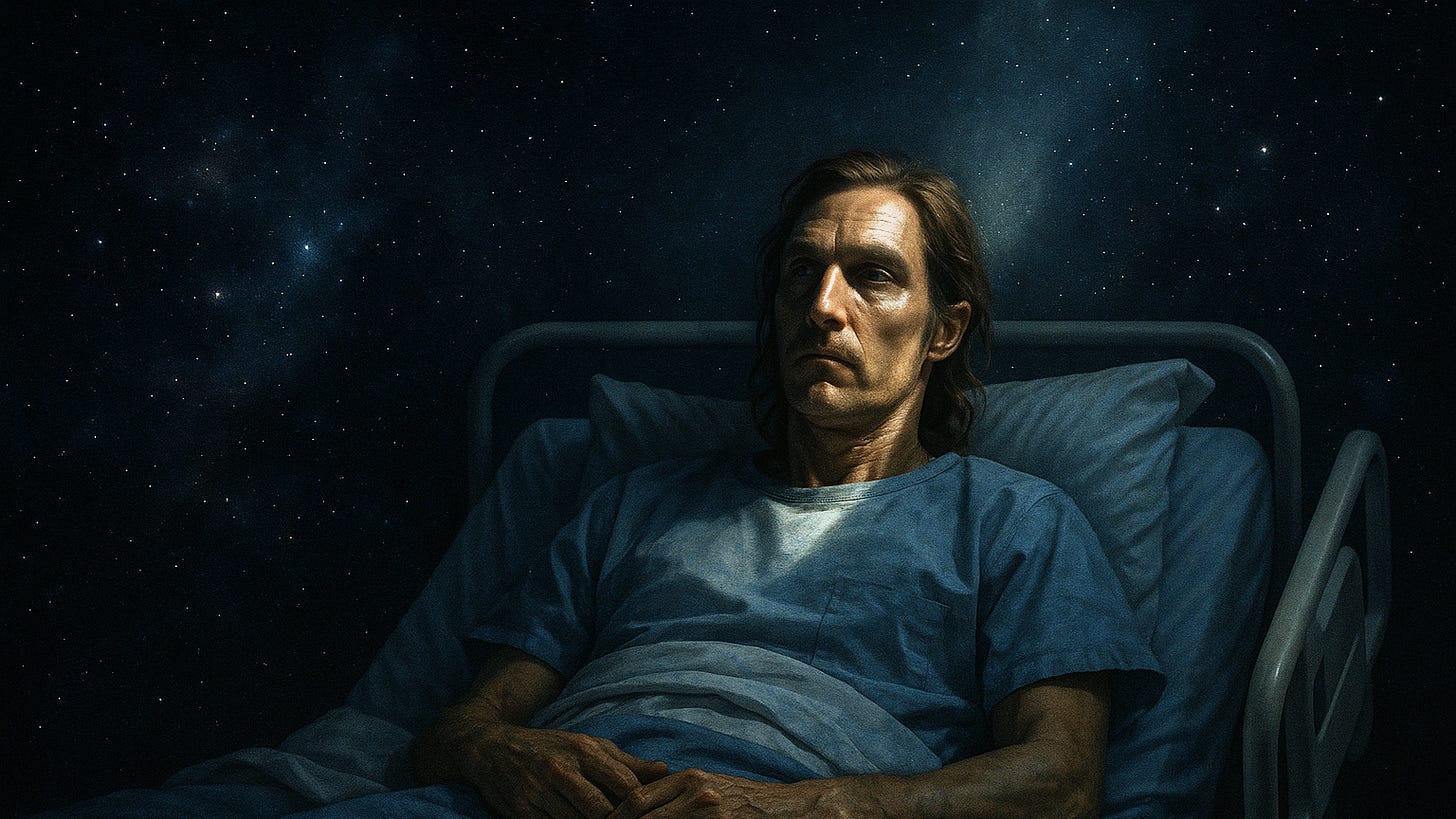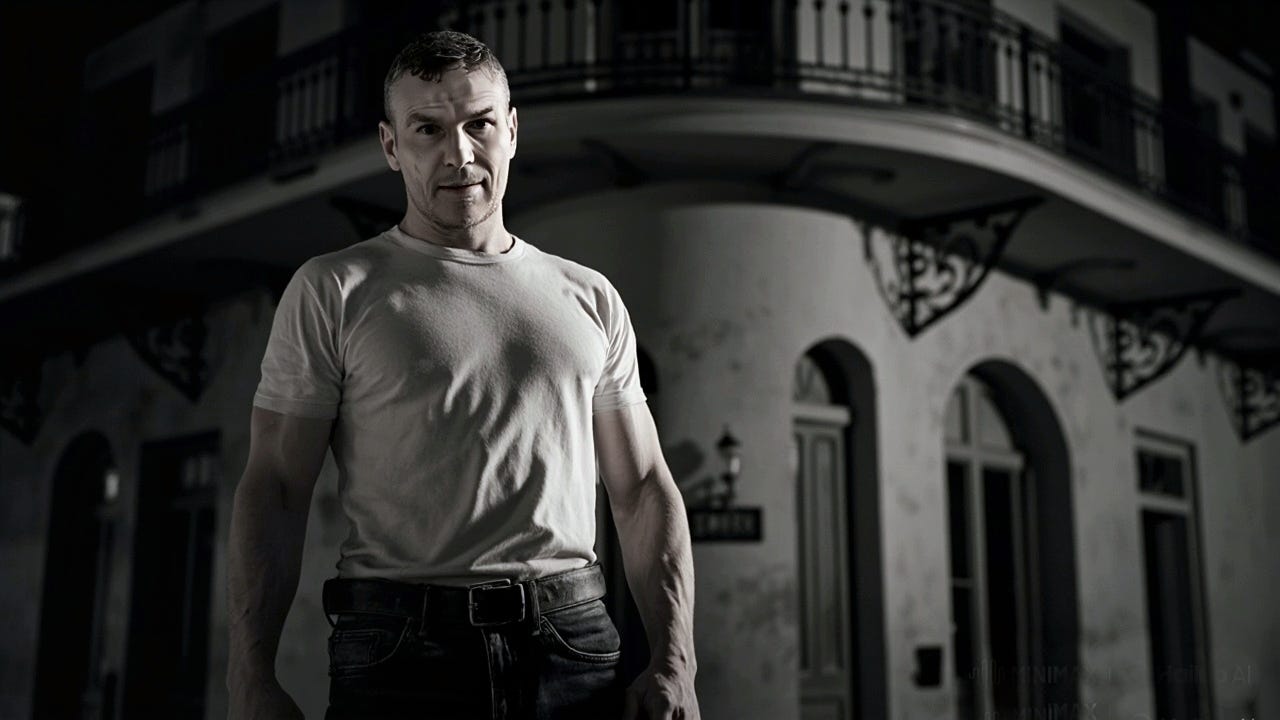Time as a Flat Circle: True Detective's Rust Cohle and the Logic of Existential Despair
Recognition, Not Redemption in HBO's Philosophical Crime Drama
Season 1 of the HBO series True Detective opens with the discovery of a murdered woman's body: bound, posed, and crowned with antlers in a ritualistic, fetishistic display, arranged with a kind of deliberate, symbolic intent. We are then introduced to Rust Cohle, a detective haunted by personal tragedy: hyper-intelligent, emotionally scarred, and alienated by his own bleak worldview. A former undercover narcotics officer turned homicide detective in Louisiana, Cohle is introspective to the point of isolation, often delivering cryptic, philosophical monologues that reveal a deep-seated nihilism.
Despite his grim outlook, he's driven not by hope, but by a refusal to look away from the darkness. This is what makes him fascinating. Rust is introduced through the eyes of his former partner, Marty Hart, who is in many ways his polar opposite: more traditional, outwardly well-adjusted, but carrying a darkness of his own that he's unwilling or unable to face.
Marty Hart: "Rust - now his Texas files were classified or redacted, and he wasn't big on talking except when you wanted him to shut up, but he was smart."
Rust's psychology and philosophy place him not only at odds with those around him, but also make him uniquely suited to see the world for what it truly is. It's worth examining the ideas he represents and the internal logic of his pessimism.
Philosophical Framework: From Gnostic Despair to Schopenhauerian Pessimism
Rust Cohle: "I think human consciousness is a tragic misstep in evolution... we became too self-aware."
Rust speaks like someone who believes we're trapped in a broken world: that consciousness itself is a prison. His view echoes the Gnostic idea of a malevolent or indifferent creator, often called Yaldabaoth: a warped reflection of the God of the Hebrew Bible, who created humankind and trapped us in the material world to satisfy its own ego. When Rust declares "Time is a flat circle," he's drawing from Nietzsche's concept of eternal recurrence, but bleaker: "Everything we've ever done or will do, we're gonna do over and over and over again." For him, time doesn't progress. It loops. There is no escape, no growth, no salvation.
This worldview finds its most perfect philosophical expression in Arthur Schopenhauer's pessimism. When Rust describes himself as "a realist, alright? But in philosophical terms I'm what's called a pessimist," he's channeling Schopenhauer's core insight: existence is will without reason, a blind, ceaseless striving that produces unending suffering. Like Schopenhauer, Rust sees human consciousness as a mistake, and believes the best we can do is confront the bleak truth without illusion.
Rust Cohle: I'd consider myself a realist, alright? But in philosophical terms I'm what's called a pessimist.
Marty Hart: Okay, what's that mean?
Rust Cohle: It means I'm bad at parties.
Marty Hart: Let me tell you, you ain't great outside of parties either.
Rust embodies antinatalism, at one point saying: "I think the honorable thing for our species to do is deny our programming, stop reproducing." His worldview echoes Eastern philosophy's claim that life itself is a fundamental error, and that our suffering arises from ego-consciousness: our identification with the self, with fear, and with desire. While he displays many Stoic virtues: self-discipline, emotional restraint, endurance of suffering, he lacks the Stoic's faith in cosmic reason. Where Marcus Aurelius says "Live according to nature," Rust responds: "We are things that labor under the illusion of having a self."
The INTP Mind: Depth Without Intimacy
Rust's personality aligns with the INTP psychological profile: abstract, philosophical, internally driven, and comfortable with ambiguity. He detests small talk but will monologue extensively on philosophy, skipping social rituals and diving straight into mortality, memory, truth, and metaphysics. He shares deep thoughts not from vulnerability, but from clarity, creating a strange intimacy in others even as he remains emotionally detached.
This dynamic is characteristic of the INTP mind: sharing what others consider private thoughts not to bond, but because that's where the mind naturally lives. Surface-level talk feels pointless. But to others, especially the emotionally attuned, that depth signals closeness. People sense his authenticity but project intimacy onto him that he doesn't return. As his partner Marty observes: "You talk that crazy shit, people think you're deep. But you're not. You're just... detached."
Moral Framework: Beyond Good and Evil
The "Bad Man" Philosophy
Marty Hart: "Do you wonder ever if you're a bad man?"
Rust Cohle: "No. I don't wonder, Marty. World needs bad men. We keep the other bad men from the door."
Rust doesn't see himself as moral, he sees himself as useful. He operates beyond conventional ideas of good and evil, embodying a kind of moral nihilism tempered by professional clarity. He's competent, not righteous. Violence is a tool, not a moral act, and those who wield it with precision, unclouded by self-righteousness, are dangerous but necessary. He doesn't trust virtue, but he respects purpose.
The Duty to Bear Witness
Marty Hart: "So what's the point of getting out of bed in the morning?"
Rust Cohle: "I tell myself I bear witness, but the real answer is that it's obviously my programming. And I lack the constitution for suicide."
Though he immediately distances himself from it with characteristic fatalism, Rust confesses that he feels compelled to bear witness, not in service of justice or redemption, but simply to acknowledge the truth. This impulse resonates with a long philosophical tradition of the divided self: from Descartes' cogito to Freud's superego, there has been an effort to explain the inner observer that stands apart, watches, and judges.
In a universe devoid of inherent meaning, Rust insists that someone must see: that the truth must be recognized. It is not an act of salvation, but of resistance: a refusal to participate in the lie by remaining silent.
Rejection of Religious Delusion
Rust Cohle: "What's it say about life, hmm? You gotta get together, tell yourself stories that violate every law of the universe just to get through the goddamn day."
When their investigation leads to a Christian tent revival, Rust shows nothing but disdain. Where Marty sees religion as a necessary civilizing force, Rust sees it as self-deception masquerading as virtue, a narcotic that comforts the weak and enables cruelty in the name of hope. This tension recalls Dostoevsky's Grand Inquisitor, who argues that humanity prefers comfort, authority, and illusion to Christ's offer of freedom and truth. For Rust, the Church doesn't liberate, it imprisons, deludes, and pacifies.
Coping Mechanisms: Drugs vs. Delusion
Rust scorns religion as self-delusion, yet relies on drugs. This apparent contradiction reveals a crucial distinction: religion lies about the structure of reality, offering false hope and false meaning. Intoxicants make no such claims. They don't preach or pretend. They're not an escape from the truth, but a way to survive it. Where religion cloaks itself in moral purpose, drugs are brutally honest: this hurts, and I need relief.
Rust's drug use isn't recreational, it's symptomatic. After his daughter's death shattered his life, he landed in deep undercover narcotics work, where years of violence and addiction blurred the line between role and self. The drugs aren't an escape from chaos but a means of enduring unbearable clarity.
Human Connections: The Capacity for Grace
The Dinner Scene - Unexpected Humanity
In the first episode, Marty brings Rust to dinner at his home. Rust arrives clearly inebriated, clutching cheap flowers, looking like a man headed to a firing squad. But despite the escape Marty offers him, Rust stays. Why? Maggie welcomes him with grace. Marty's daughters are curious, even sweet. There's laughter, shared stories, and no judgment.
As the evening progresses, Rust softens, not into sentimentality, but into presence. He speaks directly to Maggie about his daughter, his words few but lingering. He's reminded, against his will, that there's still something worth being human for. That kindness and warmth, however mundane, still exist. For a brief moment, it was grace in the face of grief.
Evolution with Marty
Rust and Marty are psychological opposites: Rust seeks the deepest, ugliest truths while Marty prefers those that preserve social order. Rust internalizes pain; Marty externalizes anger. Rust questions all rules; Marty clings to tradition. This creates constant friction, leading to a dramatic falling out and seven years of estrangement.
But when they reunite, Rust shows subtle growth. He asks personal questions, surprising Marty with genuine interest. It's not a dramatic transformation, but a quiet indication that Rust is still capable of human connection. They're better detectives (and arguably better men) together than apart.
Thematic Resonance: Loss, Myth, and Meaning
True Detective presents a modern tragedy structured in mythic terms. Both Rust and Marty are cast as ancient figures (closer to Gilgamesh or Job than conventional protagonists) men who lose everything that once defined them and gain bitter knowledge in return. They emerge changed, not victorious, and whatever victories they claim are ambiguous, temporary.
This existential bleakness mirrors the show's setting: a decaying Louisiana landscape filled with shuttered schools, fading churches, and fractured families. The rot is personal and systemic: institutions are hollowed out, evil is embedded, corruption is endemic. The mythos of the Yellow King functions as shadow myth: a Lovecraftian horror grounded not in monsters, but in ritualized human cruelty and the things polite society refuses to acknowledge.
Conclusion: The Light and the Dark
Rust Cohle's arc is not one of redemption, but of recognition. He begins as a hard materialist convinced that consciousness is a tragic misstep. But by the end, he undergoes a near-death mystical experience that subtly reorients his metaphysical framework. He senses the presence of his deceased daughter and feels surrounded by something infinite, not comforting, exactly, but vast and undeniable.
This evolution is quiet but profound. Rust transitions from a man who insists "time is a flat circle" to someone who can admit that maybe "the light's winning." He moves from isolation to fragile connection, from detachment to a tenderness that surprises even himself. It's not a transformation or rejection of who he was, but a broadening.
True Detective doesn't offer easy redemption, only hard-won clarity: that even those who see into the abyss may still choose to stay, not because the world is good, but because someone must continue to look, and because in that looking, there might be something like meaning.





